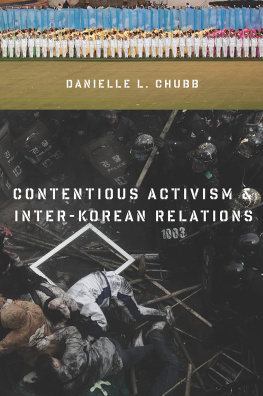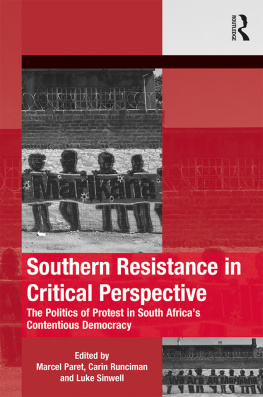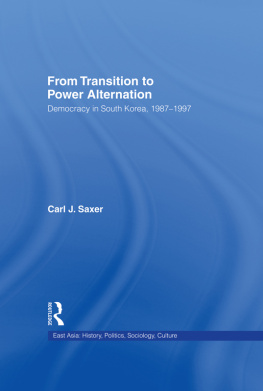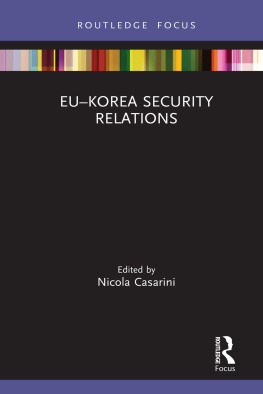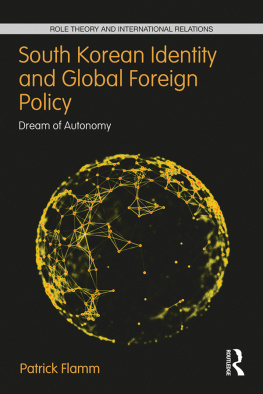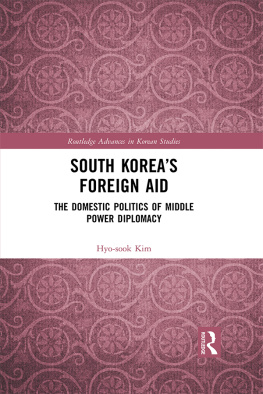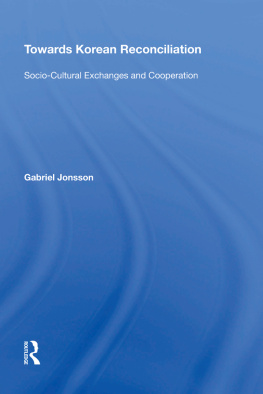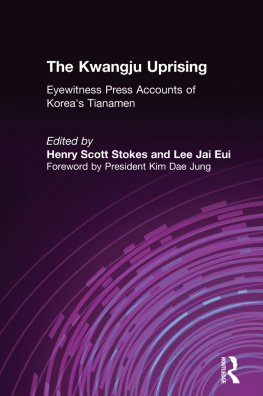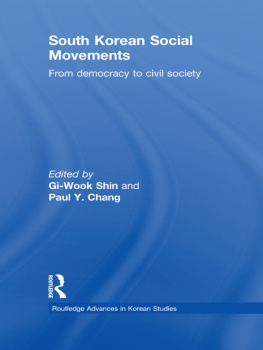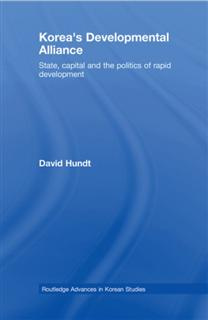CONTENTIOUS ACTIVISM & INTER-KOREAN RELATIONSContemporary Asia in the World
CONTEMPORARY ASIA IN THE WORLD
David C. Kang and Victor D. Cha, Editors
This series aims to address a gap in the public-policy and scholarly discussion of Asia. It seeks to promote books and studies that are on the cutting edge of their respective disciplines or in the promotion of multidisciplinary or interdisciplinary research but that are also accessible to a wider readership. The editors seek to showcase the best scholarly and public-policy arguments on Asia from any field, including politics, history, economics, and cultural studies.
Beyond the Final Score: The Politics of Sport in Asia, Victor D. Cha, 2008
The Power of the Internet in China: Citizen Activism Online, Guobin Yang, 2009
China and India: Prospects for Peace, Jonathan Holslag, 2010
India, Pakistan, and the Bomb: Debating Nuclear Stability in South Asia, umit Ganguly and S. Paul Kapur, 2010
Living with the Dragon: How the American Public Views the Rise of China, Benjamin I. Page and Tao Xie, 2010
East Asia Before the West: Five Centuries of Trade and Tribute, David C. Kang, 2010
Harmony and War: Confucian Culture and Chinese Power Politics, Yuan-Kang Wang, 2011
Strong Society, Smart State: The Rise of Public Opinion in Chinas Japan Policy, James Reilly, 2012
Asias Space Race: National Motivations, Regional Rivalries, and International Risks, James Clay Moltz, 2012
Never Forget National Humiliation: Historical Memory in Chinese Politics and Foreign Relations, Zheng Wang, 2012
Green Innovation in China: Chinas Wind Power Industry and the Global Transition to a Low-Carbon Economy, Joanna I. Lewis, 2013
The Great Kant Earthquake and the Chimera of National Reconstruction in Japan, J. Charles Schencking, 2013
Return of the Dragon: Rising China and Regional Security, Denny Roy, 2013
Contemporary Japanese Politics: Institutional Changes and Power Shifts, Tomohito Shinoda, 2013
Security and Profit in Chinas Energy Policy: Hedging Against Risk, ystein Tunsj, 2013
CONTENTIOUS ACTIVISM & INTER-KOREAN RELATIONS
DANIELLE L. CHUBB
COLUMBIA UNIVERSITY PRESS
New York
COLUMBIA UNIVERSITY PRESS
PUBLISHERS SINCE 1893
NEW YORK CHICHESTER, WEST SUSSEX
cup.columbia.edu
Copyright 2014 Columbia University Press
All rights reserved
Library of Congress Cataloging-in-Publication Data
Chubb, Danielle L.
Contentious activism and inter-Korean relations / Danielle L. Chubb.
pages cm.(Contemporary Asia in the world)
Includes bibliographical references and index.
ISBN 978-0-231-16136-7 (cloth : alk. paper)ISBN 978-0-231-53632-5 (e-book)
1. Korea (South)Foreign relationsKorea (North). 2. Korea (North)Foreign relationsKorea (South). 3. Korea (South)Politics and government. 4. Korean reunification question (1945)Political aspectsKorea (South). 5. Kwangju Uprising, Kwangju-si, Korea, 1980. 6. DemocratizationKorea (South)History20th century. I. Title.
DS910.2.k7C457 2014
327.0519505193dc23
2013022232
A Columbia University Press E-book.
CUP would be pleased to hear about your reading experience with this e-book at .
Book & Jacket Design: Chang Jae Lee
Jacket Image: Noh Suntag, Red House I, North Korea in North Korea #2, Pyungyang, North Korea, 2005; State of Emergency #25, Pyungtaek, South Korea, 2006
References to websites (URLs) were accurate at the time of writing. Neither the author nor Columbia University Press is responsible for URLs that may have expired or changed since the manuscript was prepared.
For my parents, Carmel and John
CONTENTS
I first came upon the idea for this project through an interest in the North Korean human rights campaign. I was drawn in by the passion of the North Korean human rights advocates, and by the transnational alliances and sometimes incongruous coalitions that had been built around the issue. However, it was not until I really started to delve deep into the micropolitics of North Korean human rights activism, the hushed tones with which the subject was treated in South Korea, and the stereotypes that I found applied to people who had taken up the cause that I realized that, for me at least, the more interesting tasks were not to examine those who had become involved, but rather those who had not, and to understand why this is such a challenging issue in South Korea. Most South Koreans have an intuitive understanding of what it is that is difficult about the issue of North Korean human rights. This is an understanding, however, that is little appreciated outside the peninsula, and it is to an expansion of this understanding that I ultimately hope to contribute. Tackling this subject, I quickly realized, would require a historical perspective that went right to the heart of the beliefs and ideas informing the South Korean progressive sphere. And thus began my foray into South Korean politics and the history of the democratization, human rights, and unification movements that have helped make the country the vibrant democracy it is today.
A wise Korean proverb counsels that one can build a mountain by collecting specks of dust (tikkl moa tae-san). This book is built from specks of dust, gathered lovingly and painstakingly across years of researching and writing. It is with great pleasure that I now acknowledge those who have accompanied me on this journey. Thanks must first be extended to all of those in South Korea who helped me navigate the difficult and emotive terrain of inter-Korean relations, and especially North Korean human rights. They opened my eyes to a Korean perspective, helping me understand that the question of how to deal with North Korea goes far beyond strategy and economics to the heart of what it means to be Korean in the twentieth and twenty-first centuries.
My institutional base in Seoul was the Institute for Far Eastern Studies (IFES), Kyungnam University. Many thanks to Ryoo Kihl-jae, who sponsored my stay and acted as my fieldwork supervisor. Andrei Lankov also acted as a de facto supervisor during my time in Seoul, and his insights into both North Korean and South Korean society are without parallel. It would be impossible to list here the names of all those individuals who were generous enough to give me their time in interviews, many of whom prefer to stay anonymous.
I spent much time with the North Korean human rights community, which comprises activists from a diverse range of political and ideological backgrounds. Many of these activists gave me their time on more than one occasion, and a special acknowledgment must be made to Joanna Hosaniak, An Kyounghee, Rev. Tim Peters and Erica Kang in Seoul, and Suzanne Scholte in Washington, D.C.: five extraordinarily committed and busy individuals who, despite their own commitments, provided me with a great deal of support and encouragement in sometimes difficult circumstances and over an extended period of time. I gratefully acknowledge the material support for this fieldwork that was provided by the Korea Foundation, the Australian governments Endeavour Program, IFES, Kyungnam University, and the Department of International Relations at the Australian National University (ANU).
This project started as an idea for a Ph.D. dissertation, which I went on to undertake in the Department of International Relations at ANU. There I worked with a group of extraordinary academic staff and graduate students, who were pillars of support at various stages. Many thanks to those I worked most closely with, especially Katherine Morton. I am particularly indebted to Kathy for encouraging me to invest time in my fieldwork and for providing me with challenging feedback on drafts, as well as for her wise and gentle support that extended far beyond the role of academic adviser. Roland Bleiker read the first iteration of the completed manuscript in detail and offered lengthy challenging and insightful comments and criticisms, which helped me to rethink my approach not just to this subject but to future academic endeavors as well. Thanks also to other colleagues who challenged, inspired and supported me, especially to Chris Reus-Smit, Ken Wells, Leonid Petrov, Tessa Morris-Suzuki, James Hoare, Heather Rae, Greg Fry, Paul Keal, Jacinta OHagan, and Mary Louise Hickey. Special mention goes to those whose personal support have also made this project possible, especially Kate Sullivan, Claire Granata, Michael OShannassy, Andrew Phillips, Jennifer Mason, and Sandra Fahy. I completed the final touches to the manuscript as a faculty member at Deakin University, where I have found an academic community that is both collegial and supportive of new research.

